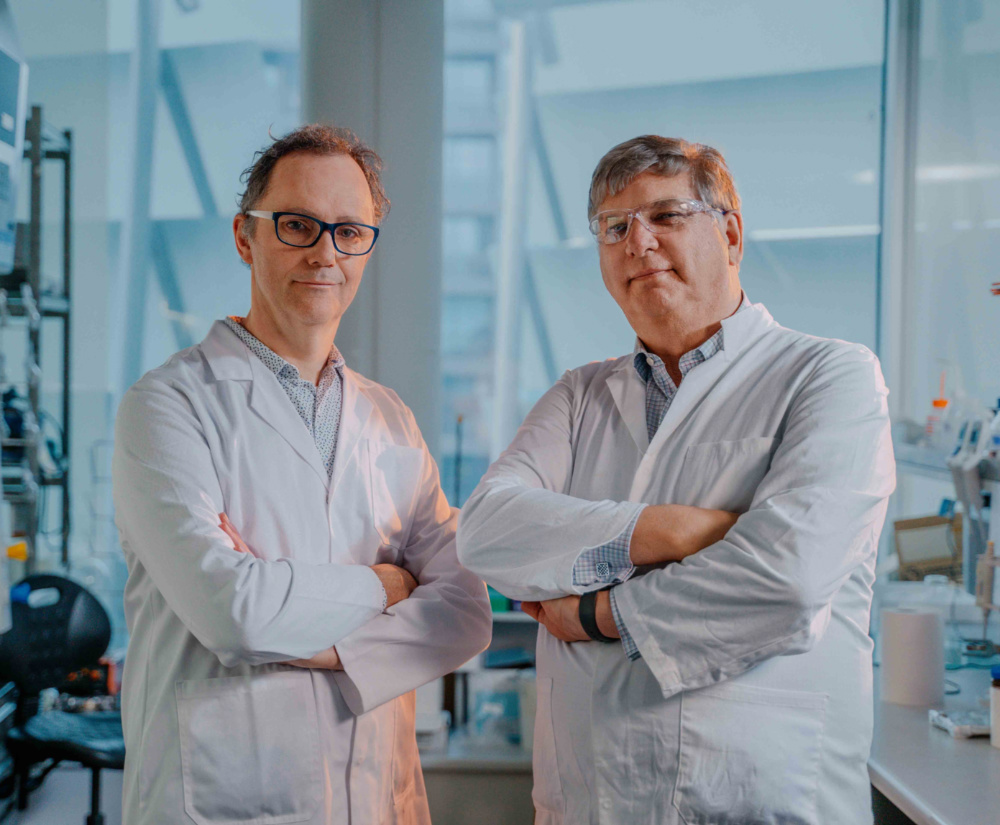Amplia CEO co-recipient of 2024 Prime Minister’s Prize for Innovation

Amplia CEO & 2024 Prime Minister Award for Innovation co-recipient Dr Chris Burns. Pic: Supplied
- Amplia CEO and managing director Dr Chris Burns and long-time scientific collaborator Professor Andrew Wilks have been awarded the 2024 Prime Minister’s Prize for Innovation
- The scientists were recognised for their breakthrough in developing momelotinib, a drug to treat rare bone marrow cancer myelofibrosis
- Momelotinib was approved by the US Food and Drug Administration in 2023 and by the European Medicines Agency in 2024
Amplia Therapeutics (ASX:ATX) CEO and managing director Dr Chris Burns and his long-time scientific collaborator Professor Andrew Wilks have been named co-recipients of the 2024 Prime Minister’s Prize for Innovation.
Burns and Wilks received the coveted award at the Prime Minister’s Prizes for Science at Parliament House in Canberra this week for their outstanding contribution to drug discovery and development in Australia through their co-invention of momelotinib, a drug to help treat a rare form of bone marrow cancer called myelofibrosis.
Wilks’ discovery of the JAK enzymes led to their co-invention of the JAK inhibitor momelotinib to treat myelofibrosis, which disrupts a person’s regular production of blood cells and impacts one in 100,000 people in Australia.
The pair invented momelotinib at the Melbourne-based biotech Cytopia, which was founded by Wilks, who is also the founder of biotech venture fund SYNthesis BioVentures.
In a rare achievement for an Australian-invented drug, momelotinib was approved by the US Food and Drug Administration (FDA) in 2023 and by the European Medicines Agency (EMA) in 2024.
Momelotinib was acquired by one of the world’s leading pharmaceutical companies for US$1.9bn (~A$2.92 bn) and is currently marketed in the US under the brand name Ojjaara.

‘Straight to the pool room’
Wilks said the discovery of momelotinib work was very much a team sport as people with extraordinary expertise across many disciplines came together for the common cause.
“It really does take a village, and it is a great privilege to have been part of this collaboration to discover these important intracellular JAK enzymes and help invent momelotinib.”
Wilks also noted that creativity was fundamental to invention.
“The ability to apply creativity to the way we shape and test molecules and the way we design medicines is incredibly important,” he said.
“To have discovered these JAK enzymes, to be part of the team that invented the medicine, and then see it become approved for the treatment of patients, was an absolute career highlight.”
Referencing a classic quote from 1997 Aussie film hit The Castle, Wilks said: “The Prime Minister’s Prize for Innovation goes straight to the pool room”.
“It is a wonderful recognition of what we have been able to deliver and a very humbling experience.”
Early positive results
Burns said when momelotinib was eventually tested in patients with myelofibrosis, data came in very quickly showing that patients were responding to the drug very favourably.
“Within three months, patients were back out of bed, going back to work and enjoying their life.
“Australia does a lot of fantastic early-stage research.
“What we’ve done in the discovery and development of momelotinib is show that incredible research can be translated here in Australia.”
Burns said that he hopes their achievement demonstrates to the next generation of scientists that it is possible to translate important discoveries into the development of medicines in Australia.
“When I started my career as a medicinal chemist, all I really wanted to do was develop medicines that improved the quality of people’s lives and treat disease.
“To receive the Prime Minister’s Prize for Innovation is a huge honour and incredibly rewarding.”
Focus on ‘heavy punch’ to cancer
Following his efforts to develop momelotinib, Burns is now investing his expertise and time into ATX, which is focused on the clinical development of two highly-promising drug candidates targeting focal adhesion kinase (FAK) that were originally discovered by the Australian-based Cancer Therapeutics Cooperative Research Centre (CRC).
The discovery involved scientists from Monash Institute of Pharmaceutical Sciences, Peter MacCallum Cancer Centre, St Vincent’s Institute of Medical Research, the Walter and Eliza Hall Institute of Medical Research and the CSIRO.
FAK inhibitors have been described as a ‘heavy punch’ to cancer, showing promising potential when used in combination with existing standard of care therapies in the treatment of solid cancers. FAK is also a potential therapeutic target in fibrosis.
ATX recently announced six patients in its Phase 2a ACCENT trial in pancreatic cancer have now achieved the required reduction in tumour size with no detection of new lesions.
The ACCENT trial is exploring the activity of ATX’s narmafotinib (AMP945), in combination with standard-of-care chemotherapy, in advanced pancreatic cancer patients.
Narmafotinib is ATX’s best-in-class inhibitor of the protein FAK, a protein over-expressed in pancreatic and other cancers.
It has been granted fast track designation by the FDA, which is available to drugs that may provide an advantage over current therapies in the treatment of serious conditions.
Fast-track designation is designed to speed the development of these drugs to enable patients to receive them sooner.
‘Profound impact’
Nominator for the Prime Minister’s Prize for Innovation CSIRO CEO Professor Doug Hilton AO said momelotinib had succeeded while most of the first-generation inhibitors developed at pharmaceutical and international biotechnology companies have failed.
“This reflects the quality of the science underpinning the discovery of the drug,” he said.
“The processes and approach exemplified by Dr Burns and Professor Wilks have been played forward to a new generation of Australian scientists and many have gone on to successful careers in pharmaceuticals and biotechnology.”
Supporter BirdGene Biosciences head of biology Dr Glenn Begley said there were few examples of scientists in Australia who have stepped outside the security of the academic environment to focus solely on translating their research into a drug that can benefit humankind.
“Together they (Burns and Wilks) have accomplished something truly remarkable.
“Outstanding basic research, brilliant chemistry, determination and commitment have come together to provide a drug with the promise of altering the course of disease for thousands of patients.”
Another strong supporter, Medicines Development for Global Health managing director Mark Sullivan AO said Burns and Wilks have shown what is possible for Australia’s researchers.
“They delivered value and benefit to our nation, and on a personal level, they are two of the most approachable and generous scientists.
“Dr Burns and Professor Wilks have built long-lasting, sustainable outcomes for patients, and continue to build businesses that provide opportunities for scientists and leadership in Australia.”
Related Topics

UNLOCK INSIGHTS
Discover the untold stories of emerging ASX stocks.
Daily news and expert analysis, it's free to subscribe.
By proceeding, you confirm you understand that we handle personal information in accordance with our Privacy Policy.








